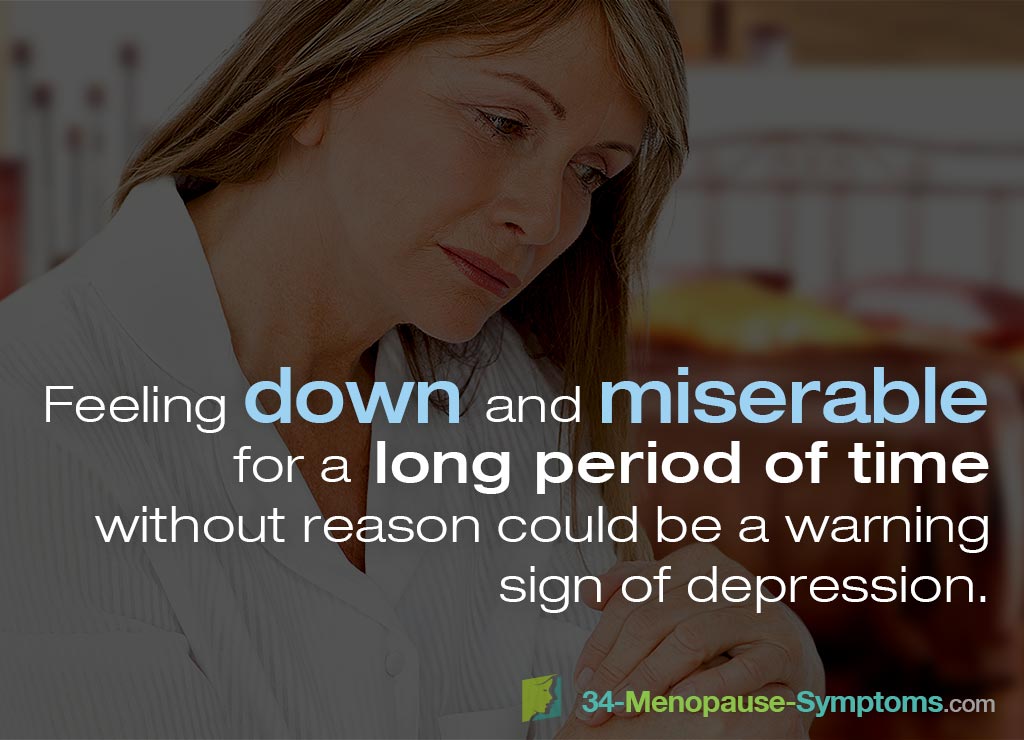Depression affects middle-aged women on many different levels by changing their eating and sleeping patterns, as well as by altering their perception and feelings. Recognizing the warning signs quickly can lessen the burden of depression on your life. They might include:
Sadness
Feeling down and miserable for a long period of time, often without it being triggered by a difficult or traumatic life event can indicate depression. Experiencing unexplained crying spells could be a warning sign, too.
Loss of Interest in Pleasurable Activities
Experiencing apathy and being unable to derive pleasure from the things that used to be enjoyable, such sports, travel, or meetings with friends is very common in depression. Feeling unengaged and absent-minded can be its sign, too.
Changes in Appetite
Losing appetite and interest in previously enjoyed food, resulting in weight loss, can signal depression. Seeking comfort in food and significantly increasing its daily intake, thus contributing to a weight gain, can be an indication as well.
Sleep Abnormalities
Not being able to fall asleep, difficulty staying asleep, or having a disturbed sleep are frequently experienced by depressed women. Some of them also sleep much more than previously.
Fatigue or Low Energy
Experiencing frequent headaches might signal depression. Feeling tired all the time and experiencing unexplained aches can also be warning signs.
Poor Concentration
Having a hard time managing time, focusing at work, or remembering things to do often occurs in depression. Some depressed women also struggle to complete various daily tasks.
Low Self-esteem
Feeling guilty, worthless, and believing nothing good will ever come to you is a strong indication that you might be suffering from depression.
Slowed Movement or Speech
Speaking, walking, and doing other things, such as writing, as if in slow-motion occurs in depression, but it is one of the less common symptoms. Older women might be particularly affected.
Agitation and Purposeless Activity
Feeling restless and tense, resulting in increased physical activity, often without any purpose can signal depression, especially if it co-exists with sleep abnormalities.
Suicidal Thoughts
Thinking about dying, planning your own death, or talking about dying, for example by saying something along the lines of “things would be better without me” is a strong warning sign of depression.
Should I Be Worried?
Depression is a serious illness and should not be left untreated. It requires a proper attention of a medical doctor and accurate treatment, such as therapy or medications, to relieve the symptoms and enable you to return to your normal functioning.
If you experience persistent thoughts about death and committing suicide, seek an immediate medical help. There are multiple free 24-hour depression hotlines available throughout the country with mental health specialists on board ready to assist you. Also, your local hospital might have a psychiatric unit to keep you safe when you are in danger of hurting yourself.
Some of the warning signs of depression are also common in other medical conditions, which might prevent you or your doctor from promptly diagnosing it. Paying attention to any changes you experience, especially in your perception of life and yourself, might help you catch depression before it overwhelms you. To do so, it might be useful to familiarize yourself with the psychological and physical symptoms of depression.
Sources
- Beyond Blue. (2016). Signs and symptoms. Retrieved August 23, 2017 from https://www.beyondblue.org.au/the-facts/depression/signs-and-symptoms
- Diagnostic and Statistical Manual of Mental Disorders. (2013). Criteria for Major Depressive Disorder. Retrieved August 23, 2017 from http://dsm.psychiatryonline.org/doi/abs/10.1176/appi.books.9780890425596.dsm04
- Dialogues in Clinical Neuroscience. (2008). Sleep disorders as core symptoms of depression. Retrieved August 23, 2017 from https://www.ncbi.nlm.nih.gov/pmc/articles/PMC3181883/
- Health Direct. (2015). Symptoms of depression. Retrieved August 23, 2017 from https://www.healthdirect.gov.au/symptoms-of-depression
- Innovations in Clinical Neuroscience. (2011). Fatigue as a Residual Symptom of Depression. Retrieved August 23, 2017 from https://www.ncbi.nlm.nih.gov/pmc/articles/PMC3225130/




